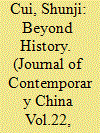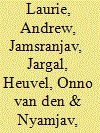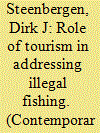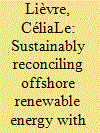| Srl | Item |
| 1 |
ID:
123704


|
|
|
|
|
| Publication |
2013.
|
| Summary/Abstract |
This article takes the proposition that cooperation in the area of non-traditional security (NTS) can provide the essential window of opportunity for Northeast Asians to move beyond history. To demonstrate, it explores the development of NTS cooperation in Northeast Asia, paying particular attention to Sino-Japanese cooperation in the environmental and disaster areas. It then examines the relationship between NTS cooperation and the construction of a regional international society in Northeast Asia. It argues that the importance of NTS cooperation is twofold. First, in a region where historical animosities remain high, NTS issues can avoid sensitive areas and find common ground for cooperation that traditional security approaches would be unable to envisage. Second, NTS cooperation has turned people-to-people relations in a more prominent and conciliatory direction, and enhanced human security consideration, thus taking things further than the indirect consequences of functionalism.
|
|
|
|
|
|
|
|
|
|
|
|
|
|
|
|
| 2 |
ID:
100030


|
|
|
|
|
| Publication |
2010.
|
| Summary/Abstract |
In comparison with their impacts elsewhere, humans have trodden relatively lightly on Mongolia's ecosystems and there is an opportunity to conserve globally threatened wild species and maintain natural ecological processes in parallel with modern economic development, but only if co-ordinated action is taken soon. Mongolia has a low population density (ca 1.68 per km2) and the pastoral lifestyle is suited to the landscape. Yet humans have degraded grasslands, damaged forests, depleted wildlife populations and polluted and overused water. Rapid social and political changes have resulted in far-reaching impacts on Mongolia's fragile ecosystems. The country is a major recipient of both foreign aid and foreign direct investment, and it is important to guide economic development with the best ecological judgment available before permanent damage is done. Government has a responsibility to establish a legal, policy and fiscal framework that provides incentives for sustainable use of the land compatible with the survival of Mongolia's wild species and ecosystems. A regional biodiversity conservation strategy for the Mongolian Altai examined direct and indirect threats and laid out a programme of actions under 12 major objectives.
|
|
|
|
|
|
|
|
|
|
|
|
|
|
|
|
| 3 |
ID:
121878


|
|
|
|
|
| Publication |
2013.
|
| Summary/Abstract |
Tackling illegal fishing through traditional state-centred approaches has proven difficult and largely ineffective in the extensive maritime environment of Southeast Asia, and particularly in the archipelagic state of Indonesia. This article focuses on the involvement of a new for-profit actor - a private tourism dive operator - in addressing illegal fishing in a small island archipelago in eastern Indonesia. The case study demonstrates that the dive operator has been able to employ conventional enforcement methods such as patrolling and the capture of illegal fishers, in combination with alternative approaches to addressing the root causes of illegal fishing. It also explores the relationship of the dive operator with civil society actors, non-governmental organizations (NGOs) and various state agencies involved in maritime security and conservation governance in the area. With a particular focus on the dive operator's relationship with government agencies, the case study shows that local governments are collaborating with private actors and providing opportunities for new kinds of enforcement agents since they themselves lack sufficient resources to patrol waters effectively. The dive operator, however, operates only within a space granted by the district government, and must invest considerably in this relationship to maintain his position.
|
|
|
|
|
|
|
|
|
|
|
|
|
|
|
|
| 4 |
ID:
166567


|
|
|
|
|
| Summary/Abstract |
The nascent nature of offshore renewable energy (ORE) technologies coupled with the existence of considerable data gaps and uncertainty on the receiving marine environment demands a paradigm shift in our approach to assessing and managing the impacts of the ORE sector on marine Natura 2000 sites. This paper investigates how the ecosystem-based principles of resilience and adaptive management can be best applied under the appropriate assessment process of the Habitats Directive to reconcile the increasing demand for offshore renewables and biodiversity conservation. In so doing, it challenges the strict interpretation of the precautionary principle which has been crystallised by the EU judiciary under the regime of Article 6(3) of the Habitats Directive and suggests embracing adaptive management as a better methodology to enhance the outcomes of the appropriate assessment in the face of uncertain impacts on Natura 2000 sites and their qualifying features. The aim of this study is solution-based: it seeks to improve the implementation of the assessment procedure of the Habitats Directive before it truly becomes an ‘obstacle course’ for offshore renewable energy developers.
|
|
|
|
|
|
|
|
|
|
|
|
|
|
|
|